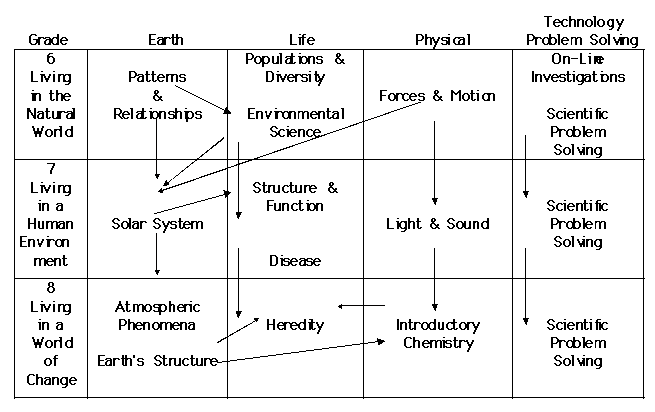 |
























|
 |
 |
|
author:
|
Gerard F. Consuegra
|
|
submitter:
|
Science Connections Project
|
|
description:
|
Following nearly two years of development and training, project staff has made curriculum decisions for a revised middle school science program. These decisions were made through a collaborative process involving input from Master Science Teachers (Science Connections Lead Teachers), Science Resource Teachers (local school science department chairs), grade level science teachers, and scientists.
Read about Science Connections' Middle School Science Core Materials.
|
|
published:
|
02/11/1999
|
|
posted to site:
|
02/11/1999
|
Science Connections
NSF LSC Project
Montgomery County Public Schools
Rockville, Maryland
Background Information
Following nearly two years of development and training, project staff has made curriculum decisions for a revised middle school science program. These decisions were made through a collaborative process involving input from Master Science Teachers (Science Connections Lead Teachers), Science Resource Teachers (local school science department chairs), grade level science teachers, and scientists. The decisions consist of the following:
- Science Process Outcomes
- Science Content Outcomes
- Science Units
- Core Science Materials
- Support Science Materials
The science process and content outcomes were developed to be consistent with the National Science Education Standards (National Academy of Science) and Benchmarks for Science Literacy (American Association for the Advancement of Science). Furthermore, the process and content outcomes were designed to satisfy the Maryland Science Outcomes for middle school. The Science Process Outcomes may be viewed by pointing web browsers to
http://www.mcps.k12.md.us/curriculum/science/
The Science Content Outcomes are being reviewed and validated by a committee of science educators and scientists and will be available on the cited web site in the near future.
Science Unit and Grade-Level Decisions
Middle school science unit decisions emerged through a process of analyzing outcomes and grouping outcomes into like and related topics. Once the units were named, a workgroup made grade-level decisions for the units and began identifying materials to be used to implement the units. The attached PowerPoint file lists these issues as assumptions (i.e., fundamental, multigrade, developmental, and other). Three of the slides list the grade-level decision for units and core science materials to be used. The final slide depicts units by content strand (i.e., Earth, Life, Physical, Technology/Problem Solving) and grade level (i.e., Grade 6, Grade 7, Grade 8). Furthermore, that slide shows connections among the units.
Current and Future Steps
Project staff has begun training science teachers on using core science materials to implement a revised unit organization for middle school science. While many core materials have been identified to satisfy the units, some units do not have core materials. Rather than identifying less than satisfactory materials, project staff decided to allow teachers to use local materials in hopes that new high quality materials will emerge. Considering the current development work and field testing of middle school science materials by the National Science Resources Center and the Lawrence Hall of Science, the delay in making these decisions seems prudent. Over the next six to twelve months, as pilot materials become available, they will be examined further and designated as core materials, as appropriate.
Additional information may be obtained from:
Gerard F. Consuegra, Ph.D.
Principle Investigator
gerry_consuegra@fc.mcps.k12.md.us
MS Science Framework
Science Connections NSF LSC Project
Montgomery County Public Schools
Rockville, Maryland
gerry_consuegra@fc.mcps.k12.md.us
|
Comprehensive Program
- Maryland Science Outcomes
- National Science Education Standards
- AAAS Benchmarks for Science Literacy
|
|
Summer 1997
- Science Process Outcomes
- Inquiry
- Problem Solving
- Six Process Strands
- Know and Be Able to Do
|
|
Summer 1998
- Science Content Outcomes
- Earth, Life, and Physical Science
- Know
and Be Able to Do
|
|
Framework Organization
- Units
- Recommended Materials
|
|
Assumptions - Fundamental
- Outdoor education
- remain in Grade 6
- more than 3-day/2-night experience
- Human body/biology remain a significant part of Grade 7
- Earth science remain a significant part of Grade 8
|
|
Assumptions - Multigrade
- Earth, Life, and Physical sciences
- Problem solving/scientific thinking
- Technology
|
|
Assumptions-Developmental
- Grade 6: concrete and problem solving
- Grade 7: toward abstract and include more content
- Grade 8 : more abstract and with rigorous content
|
|
Assumptions - Other
- Need materials that qualify for technology funds
- No more than 2 EBS units per grade
- Variety of materials preferable to limited materials
|
|
Framework Structure
- Content outcomes organized into units
- No specific grade level assigned
- Considered developmental appropriateness
- Considered teacher grade-level comfort
- Intended grade-levels guided grade-level decisions
|
|
MS Science Units
- Disease
- Heredity
- Solar System
- Light & Sound
- Earth's Structure
- Motion and Forces
- Introductory Chemistry
- Environmental Science
|
|
More MS Science Units
- Atmospheric Phenomena
- Patterns & Relationships (Celestial Motion)
- Populations & Diversity (Ecosystems and Outdoor Education)
- Structure & Function (Life processes, organ systems, cells)
|
|
Grade 6 Decisions
- Populations & Diversity (Outdoor Ed)
- Environmental Science (Chesapeake Choices & Challenges)
- Forces and Motion (Thrill Ride!)
- Patterns & Relationships (Measuring Time)
- On-Line Investigations (MYDL)
- Scientific Problem Solving (Science Sleuths)
|
|
Grade 7 Decisions
- Structure & Function (Local Units)
- Disease (Outbreak!)
- Light & Sound (Making Waves; Ear to the Sky)
- Scientific Problem Solving (Science Sleuths)
- Solar System (Asteroid!)
|
|
Grade 8 Decisions
- Atmospheric Phenomena (Hurricane!)
- Earth's Structure (Local Units; Natural Disasters; Volcano!/Earthquakes!)
- Introductory Chemistry (Local Units)
- Heredity (Local Units; Lost Children)
- Scientific Problem Solving (Science Sleuths)
|
|
Thematic Proposal
- Grade 6: Living in the Natural World
- Grade 7: Living in a Human Environment
- Grade 8: Living in a World of Change
|
Unit Connections w/ Themes

|

